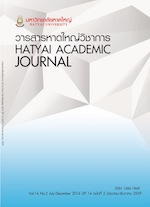การมีส่วนร่วมของประชาชนในการจัดการป่าชุมชน: กรณีศึกษาป่าชุมชน โคกกระโหล่งโป่งแดง ตำบลหนองเรือ อำเภอนาเชือก จังหวัดมหาสารคาม
Main Article Content
Abstract
Public Participation in the Management of Community Forests: A Case Study on Community Forests at Koke Kralong Pong Dang, Nong Reua, Na Chuak, Maha Sarakham
The research objectives are of the followings: 1) to study the ecological system of the forest, forest diversity, relationships between people and the forest, and the utilization of the forest; 2) to develop the forest management guidelines, conservation, and reforestation with involvement of the communities. The researchers adopted Participatory Action Research: the PAR technique in a selected study area located in Kok Kalong Pong Dang Community Forest, Na-Chuak District, Mahasarakham Province. The research tools used are composed of the survey technique with participation of the community, group discussions and community meetings. Researchers also conducted a field study of the diversity of plants and animals. The stakeholders of this research are comprised of local community leaders, including formal and informal leaders; personnel of Land Reformation for Agriculture of Thailand; the Community Forest Committee; villagers; beneficiaries from the forests; and 50 teachers and students from Nong Por School. The study provided these facts: 1) surrounding communities directly or indirectly benefited from the community forest; for example, as a food sources, sources of traditional medicine, for construction, for energy resources and for practicing of traditional beliefs. In addition, the community forest is also an “open classroom” for nature studies and bio-diversity; 2) holistic knowledge management has risen up from consciousness of the community members at a time that they are confronted with the problems and a need to find successful solutions. These solutions are driven to find a way to work hand in hand to tackle problems of forest conservation and to find solutions for forest and natural resources restoration. In addition, with support from government offices in terms of knowledge and budget, knowledge learning has started and thus brings about the people’s involvement in the management of community forests.
Article Details
All published articles are evaluated by three qualified peer reviewers from various institutions through a double-blind process, where reviewers do not know the authors’ identities and authors do not know the reviewers’ identities. The content and articles in the Hatyai Academic Journal reflect the authors’ views only and are neither the opinions of the editorial board nor the responsibility of Hatyai University. The Editorial Board of the Hatyai Academic Journal allows articles to be reproduced for academic purposes, on the condition that the original source is clearly cited.


